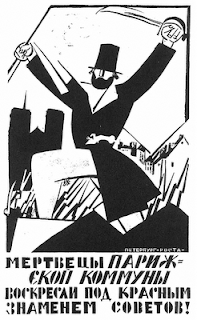Housing, Democracy, Communism
This fourth chapter of Lenin’s “The State and Revolution” (linked below) presents a study circle with a problem. As short as it is, yet there is too much in this chapter to discuss in a 1½ hour session.
So, one must remember that the Freirean requirement from any text is only that it provides a good occasion for dialogue. The dialogue is where the value lies, because it generates socialised learning. We are not trying to learn the text in its entirety, as individuals.
So, one must remember that the Freirean requirement from any text is only that it provides a good occasion for dialogue. The dialogue is where the value lies, because it generates socialised learning. We are not trying to learn the text in its entirety, as individuals.
Therefore, since this chapter is a rehearsal, almost a catalogue, of critical contributions made by Frederick Engels, plus remarks of Lenin’s own, here are some of the many topics that could be taken in a dialogue, from it:
Housing Question
"How is the housing question to be settled then? In present-day society, it is settled just as any other social question: by the gradual economic levelling of demand and supply, a settlement which reproduces the question itself again and again and therefore is no settlement.” [Engels]
Authority
"Have these gentlemen ever seen a revolution? A revolution is certainly the most authoritarian thing there is; it is an act whereby one part of the population imposes its will upon the other part by means of rifles, bayonets and cannon, all of which are highly authoritarian means. And the victorious party must maintain its rule by means of the terror which its arms inspire in the reactionaries.” [Engels]
Monopoly capitalism (remarks on the Erfurt Programme)
The "proximity" of such capitalism to socialism should serve genuine representatives of the proletariat as an argument proving the proximity, facility, feasibility, and urgency of the socialist revolution, and not at all as an argument for tolerating the repudiation of such a revolution and the efforts to make capitalism look more attractive, something which all reformists are trying to do.
…the democratic republic is the nearest approach to the dictatorship of the proletariat. [Lenin]
National Question
Engels, like Marx, never betrayed the slightest desire to brush aside the national question. [Lenin]
Religion
…the party struggle against the opium of religion which stupifies the people. [Lenin]
The State (in the Paris
"... in order not to lose again its only just-gained supremacy, this working class must, on the one hand, do away with all the old machinery of oppression previously used against it itself, and, on the other, safeguard itself against its own deputies and officials, by declaring them all, without exception, subject to recall at any time...."
“…in Germany
Communist and Social-Democrat
Engels wrote that in all his articles he used the word "Communist", and not "Social-Democrat". [Lenin]
Overcoming of democracy
…it is constantly forgotten that the abolition of the state means also the abolition of democracy; that the withering away of the state means the withering away of democracy.
At first sight this assertion seems exceedingly strange and incomprehensible; indeed, someone may even suspect us of expecting the advent of a system of society in which the principle of subordination of the minority to the majority will not be observed - for democracy means the recognition of this very principle.
No, democracy is not identical with the subordination of the minority to the majority. Democracy is a state which recognizes the subordination of the minority to the majority, i.e., an organization for the systematic use of force by one class against another, by one section of the population against another.
We set ourselves the ultimate aim of abolishing the state, i.e., all organized and systematic violence, all use of violence against people in general. We do not expect the advent of a system of society in which the principle of subordination of the minority to the majority will not be observed.
In striving for socialism, however, we are convinced that it will develop into communism and, therefore, that the need for violence against people in general, for the subordination of one man to another, and of one section of the population to another, will vanish altogether since people will become accustomed to observing the elementary conditions of social life without violence and without subordination. [Lenin]
This is a very full concretisation of the question of democracy and communism.
Image: Lenin in late 1917, probably only a few weeks after writing “The State and Revolution”. And yes, we do know that Trotsky can be seen lounging against the woodwork in the uncropped version of this photo; but this post is not about Trotsky.
Click here to download the text of State & Revolution, Chapter 4, Engels’ Supplementary Explanations, Lenin (9007 words, 12 pages)
Previous main Communist University posts: | |||
Channel [members] | Course Archive | Weeks | Posted |
SADTU Pol Ed [435] | 3/6 | ||
CU Africa [229] | 3/33 | ||
CU [3146] | 2/10 | ||
Courses completed in 2010 to date: | |||
12 | March - June | ||
10 | January - March | ||
3 days | 2-4 June | ||
10 | March - June | ||
10 | January – March | ||
Click here to visit Marxists Internet Archive | |||







